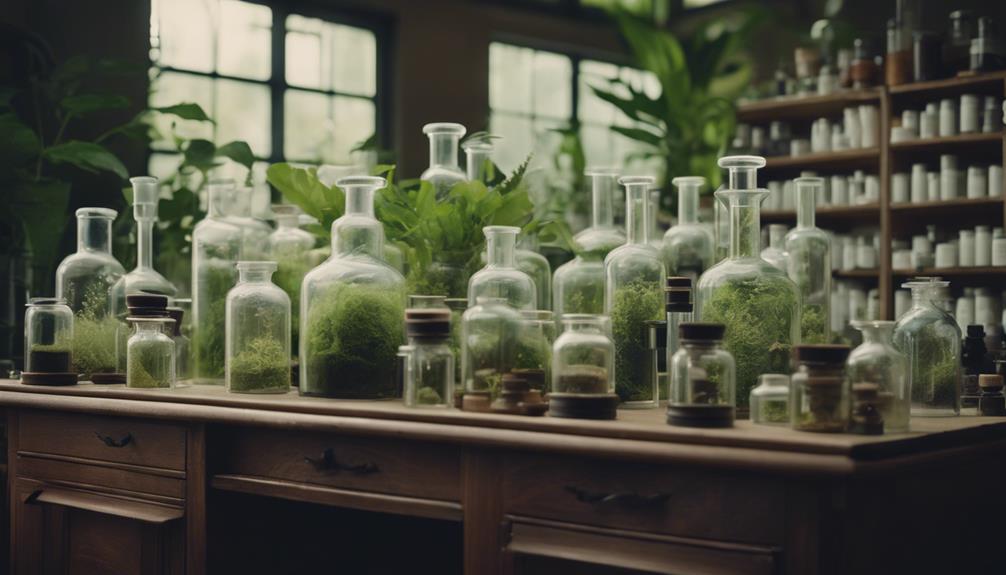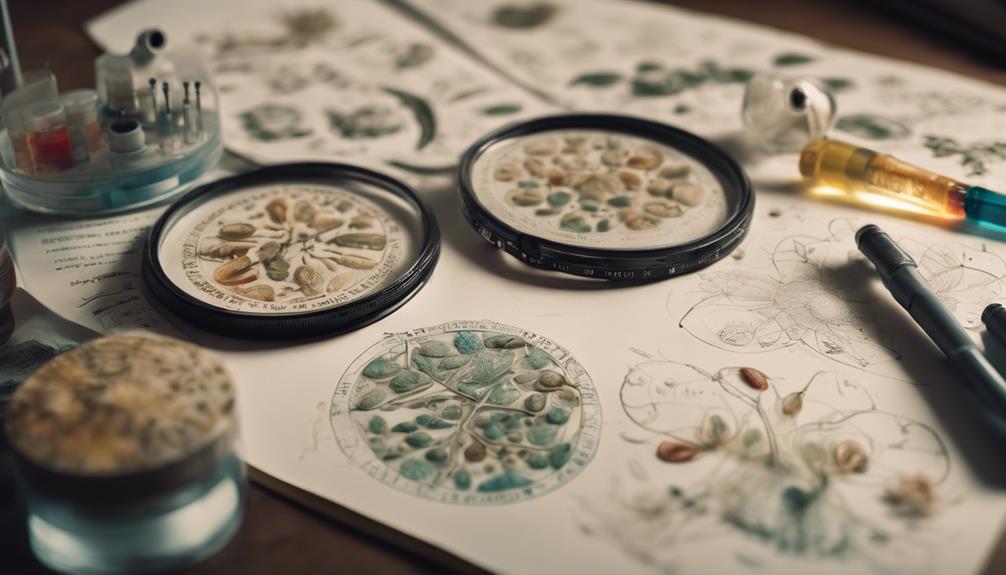Herbology, an ancient practice rooted in traditional wisdom, has evolved greatly through the integration of modern scientific advancements, resulting in a unique blend of natural healing principles and evidence-based practices. Ancient civilizations, such as Egypt, China, and Indigenous tribes, laid the foundation for modern herbology, showcasing a sophisticated understanding of plant-based remedies and medicinal applications. Today, herbology combines traditional wisdom with scientific research, incorporating advanced technologies and evidence-based practices to develop innovative herbal products. As you explore the world of herbology, you'll discover the intricate dance between ancient wisdom and modern science, shaping the future of natural healthcare.
Key Takeaways
• Ancient civilizations laid the foundation for modern herbology, with sophisticated understanding of plant-based remedies and medicinal applications.
• Modern herbology blends traditional wisdom with scientific research, incorporating advanced technologies and evidence-based practices.
• Formal degree programs in herbal sciences equip graduates for careers as herbalists, botanical researchers, or health consultants.
• The scientific basis of herbology involves identification and isolation of bioactive compounds, standardized and clinically tested for efficacy and safety.
• Stricter regulations and quality control measures are needed to ensure safety and efficacy of herbal products, addressing concerns over inconsistent quality and contamination.
Ancient Roots of Herbology
The ancient civilizations of Egypt, China, and Indigenous tribes laid the foundation for modern herbology, with their sophisticated understanding of plant-based remedies and medicinal applications. These civilizations recognized the intrinsic value of plants in maintaining health and wellness, utilizing them to treat various ailments and diseases.
Ancient texts, such as the Ebers Papyrus and the Huangdi Neijing, contain detailed records of medicinal plants and their uses. The knowledge accumulated by these ancient cultures has been passed down through generations, influencing the development of modern herbal medicine. Their contributions have paved the way for contemporary herbology, which continues to draw upon traditional wisdom while incorporating modern scientific research and methodologies.
Herbology in Modern Times

One hundred thousand years of accumulated knowledge have culminated in modern herbology, a dynamic field that seamlessly blends traditional wisdom with cutting-edge scientific research to address contemporary health concerns.
Today, herbology has evolved to incorporate advanced technologies and evidence-based practices, ensuring the development of safe and effective herbal remedies. The integration of traditional knowledge with modern scientific methods has led to significant breakthroughs in the field.
| Herbal Remedy | Traditional Use | Modern Application |
|---|---|---|
| Turmeric | Anti-inflammatory | Arthritis treatment |
| Ginger | Digestive aid | Nausea relief |
| Ginseng | Energy booster | Cognitive function enhancement |
| Valerian | Sleep aid | Anxiety treatment |
| Echinacea | Immune system booster | Cold and flu treatment |
As modern herbology continues to advance, it is poised to play a crucial role in shaping the future of healthcare.
Education and Career Pathways
Formal educational institutions, including Bastyr University and Maryland University of Integrative Health, now offer thorough degree programs in herbal sciences, providing a structured pathway for aspiring herbalists to acquire theoretical foundations and practical skills.
These programs cover essential topics such as botany, plant chemistry, and pharmacognosy, ensuring graduates are well-equipped to pursue careers as herbalists, botanical researchers, or natural health consultants. Practical training prepares students for real-world applications in holistic healthcare settings.
Continuous education through workshops and seminars is essential to stay updated and competitive in the field of herbology. As the demand for natural health solutions grows, the opportunities for herbal professionals are expanding, offering a fulfilling and in-demand career path.
The Science Behind Herbology

Derived from the synergy of traditional knowledge and scientific inquiry, herbology's scientific basis relies on the identification and isolation of bioactive compounds, which are then standardized and clinically tested to guarantee efficacy and safety in medicinal applications.
This rigorous process involves phytochemical analysis, in vitro and in vivo studies, and human clinical trials to validate the therapeutic potential of herbal remedies.
By leveraging advances in pharmacology, biochemistry, and molecular biology, modern herbology has evolved to develop evidence-based herbal products that meet the highest standards of quality and efficacy.
This integration of traditional wisdom with cutting-edge scientific methodologies has positioned herbology at the forefront of natural healthcare innovation.
Regulations and Safety Considerations
As the scientific foundation of herbology continues to strengthen, attention turns to the regulatory landscape, where the lack of standardized oversight for herbal remedies raises important safety considerations. Unlike conventional drugs, which undergo rigorous testing and approval processes, herbal remedies often fall under the category of dietary supplements, exempt from stringent regulations.
This lack of oversight can lead to inconsistent quality, contamination, and adverse interactions. Moreover, the varying levels of training and expertise among herbal practitioners can also compromise safety. As the demand for herbal remedies grows, it is crucial to establish stricter regulations and quality control measures to guarantee the safety and efficacy of these products.
Digital Age of Herbology

How are digital platforms transforming the way we learn about, access, and interact with herbology, and what implications do these changes hold for the future of this ancient practice?
The digital age has revolutionized herbology, making it more accessible and convenient. Here are some key aspects of this transformation:
- E-learning platforms:
Online courses and virtual labs provide flexible learning options for students.
- Telemedicine:
Remote consultations enable global access to expert herbalists and practitioners.
- Digital marketplaces:
Online stores and e-commerce platforms have increased the availability of herbal products.
- Information hubs:
Digital resources and online forums facilitate the sharing of knowledge and experiences among herbal enthusiasts.
These digital advancements have opened up new avenues for the growth and development of herbology, enhancing its relevance in modern healthcare.
Market Growth and Innovation

The global herbal supplements market is projected to reach unprecedented heights, driven by increasing consumer demand for natural health solutions and innovative product developments.
The market's growth is fueled by consumers seeking alternative approaches to healthcare, leading to a rise in demand for herbal supplements and functional foods. In response, companies are investing in research and development to create innovative products that cater to this growing demand. This has led to the emergence of new product categories, such as personalized nutrition and wellness products.
As a result, the market is expected to experience significant growth, with an increasing number of players entering the market to capitalize on this trend. This growth is expected to continue, driven by consumer preference for natural and holistic approaches to health and wellness.
Frequently Asked Questions
How Does Herbology Address Mental Health and Emotional Well-Being?
Herbology addresses mental health and emotional well-being by utilizing plant-based remedies to promote relaxation, reduce anxiety, and enhance mood.
Herbal remedies such as passionflower, chamomile, and lavender have been traditionally used to calm the mind and body. Modern research has validated their efficacy, revealing the potential for herbal supplements to support mental health.
Additionally, herbalists consider the individual's unique constitution and emotional state when creating personalized treatments, fostering a holistic approach to mental wellness.
Can Herbal Remedies Interact With Prescription Medications?
Millions of people worldwide rely on herbal remedies, but an important consideration is their potential interaction with prescription medications.
Yes, herbal remedies can interact with prescription medications, leading to adverse effects or reduced efficacy.
For instance, St. John's Wort can decrease the effectiveness of certain antidepressants, while ginkgo biloba can increase the risk of bleeding when taken with anticoagulant medications.
Consulting a healthcare professional before combining herbal remedies with prescription medications is vital to guarantee safe and effective treatment.
Are Herbal Supplements Suitable for Children and Pregnant Women?
Herbal supplements can be risky for children and pregnant women due to potential interactions with medications, allergic reactions, and unknown long-term effects.
Children's developing bodies may be more susceptible to adverse reactions, while pregnant women may risk harming their unborn child.
It is essential for these vulnerable populations to consult a healthcare professional before using herbal supplements, ensuring safe and informed decisions.
How Does Herbology Approach Chronic Diseases Like Diabetes and Cancer?
As the ancient Greek physician Hippocrates aptly stated, 'Everything in excess is opposed to nature.' This wisdom resonates in herbology's approach to chronic diseases like diabetes and cancer.
Can Herbal Remedies Be Used in Conjunction With Conventional Cancer Treatment?
In conjunction with conventional cancer treatment, herbal remedies can be used to alleviate symptoms, enhance treatment efficacy, and improve quality of life.
Certain herbs, such as turmeric and ginger, have anti-inflammatory and antioxidant properties, which can help mitigate chemotherapy side effects.
However, it is important to consult with a qualified healthcare professional to guarantee safe and effective integration of herbal remedies into cancer treatment plans, as potential interactions with conventional medications must be carefully considered.
Conclusion
In summary, the convergence of ancient wisdom and modern science has propelled herbology into a dynamic, interdisciplinary field.
As the global market expands, rigorous research, education, and regulation are essential to harnessing the full potential of herbal remedies.
Like a rich tapestry, the threads of traditional knowledge and scientific inquiry are woven together, promising a brighter future for healthcare.
As this field continues to evolve, one thing is certain: the ancient art of herbology has finally come of age, poised to revolutionize the future of health and wellness.










